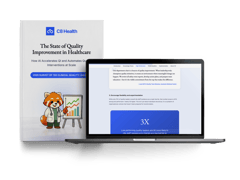
3 Effective Knowledge Management Strategies for Healthcare Organizations
In healthcare, every decision is important. That's why it's critical to have effective knowledge management in place. But, hospitals are often at the forefront of medical innovation, facing challenges in organizing, sharing, and using the information.
Below, we'll explore common hurdles faced by healthcare institutions and effective knowledge management strategies to address them.
» Implement effective knowledge management via a cloud-based software
Benefits of Effective Knowledge Management
Knowledge management is a critical component of modern healthcare. It involves capturing, organizing, sharing, and using information to improve decision-making, operational efficiency, and patient outcomes.
Here's why how it benefits hospitals:
- Accurate Diagnoses: Access to up-to-date medical information and research helps healthcare providers make accurate diagnoses.
- Effective Treatment Plans: A well-managed knowledge base helps providers to select the most appropriate treatment options based on evidence-based practices.
- Better Patient Safety: Healthcare organizations can reduce the risk of medical errors and improve patient safety by sharing best practices and lessons learned.
- Streamlined Processes: Effective knowledge management simplifies administrative tasks, such as scheduling, billing, and documentation, leading to increased efficiency.
- Reduced Costs: By automating tasks and reducing manual processes, healthcare organizations can save time and money.
- Improved Compliance: Knowledge management can help ensure compliance with regulatory requirements, such as HIPAA and Joint Commission standards.
- Easier Communication: Knowledge management improves communication between healthcare providers, patients, and staff.
» Learn to implement best practices for knowledge management
1. Balance Policies and Procedures
One of the core challenges in centralized knowledge management is balancing organizational policies and departmental procedures. Let's say you want to implement it but have a hospital network with many campuses. This means each campus has different equipment, staff, and expertise.
Now, you dig a little deeper and see that inside each campus are departments like ER, internal medicine, cardiology, anesthesiology, and intensive care.
With so much segmentation, how do you standardize the treatment of a condition like atrial fibrillation? Each department should ensure that its treatment methods align with overall organizational goals and standards.
Here's another example. For stroke patients, time is of the essence. Effective treatment demands a coordinated response from emergency medicine, neurology, and radiology. These departments have to work together seamlessly to ensure prompt and appropriate care.
This coordinated approach-while essential for stroke patients-is also crucial for effective care in other complex conditions. In this case, the national or organizational guidelines are a general framework. That's why adapting them to the specific needs of a healthcare system or department is crucial.
» Find out how interprofessional collaboration helps nurses
2. Make Guidelines and Policies Easily Available
1 in every 10 patients.
That's the number of people harmed during inpatient care, according to the WHO. It adds up to about 3 million deaths yearly. We'll either improve patient safety or end up a part of this statistic. [1]
But how do we do that?
Healthcare is heavily regulated with policies and procedures on patient safety, but manually tracking all of them is impossible in the long run. Why? Because there are around 629 discrete regulatory requirements across 9 domains. [2]
All of this information is scattered across departmental systems, but the amount of administrative work is sure to be a nightmare to manage at scale. That's why we've created C8 Health, a specialized platform by providers for providers. Our team will upload all your guidelines and policies onto the cloud-no IT resources required.
The AI-powered search will help your staff get the latest organizational know-how by using natural language queries. They will ask our AI assistant a question and get the related information as an answer. Your staff will never be stuck without guidance-especially in critical acute care settings.
Providers can also easily collaborate and update documents using our rich text editor. Using our Smart Formats, they will be able to embed multiple types of content and make them easily accessible from a single document.
3. Understand Structured vs. Unstructured Knowledge Sharing
In healthcare, structured and unstructured knowledge sharing have distinct pros and cons that impact patient care and operational efficiency.
Here are the main differences:
Structured Knowledge Sharing
Structured knowledge sharing revolves around formal communication channels and established protocols. It offers several advantages:
- Standardized Care: Guidelines and protocols are a standardized and coordinated approach to patient care. They ensure your staff consistently follows evidence-based practices, which improves patient safety and care quality.
- Clarity and Consistency: Protocols are clear, evidence-based instructions for various medical scenarios. Their clarity reduces the chances of misunderstandings.
- Foundation for Decision-Making: While allowing room for clinical judgment, protocols serve as a solid foundation for healthcare decision-making. They provide a starting point for addressing common medical issues.
As we discussed in the previous section, guidelines and protocols-structured knowledge-are ineffective when scattered between different departments and servers. That's why you should invest in a central repository.
» Learn the difference between knowledge and information management
Unstructured Knowledge Sharing
Unstructured knowledge sharing also plays a role in healthcare. It's often rooted in informal communication and personal experience.
Advantages:
- Informal Expertise: Informal discussions among healthcare professionals can offer insights based on personal experiences and clinical judgment. This can be especially valuable in complex or unique cases where established protocols may not fully apply.
- Strong Bonds With Colleagues: Communication encourages collaboration and mentorship, helping to build stronger relationships.
Challenges:
- Barriers to Communication: Communication in acute settings can be prone to misinterpretation, leading to errors in patient care.
- Time Constraints: Finding the right person to consult in a busy healthcare environment can be time-consuming, potentially delaying critical decisions.
- Lack of Reproducibility: Unstructured knowledge sharing relies heavily on individual experiences, making it less reproducible and consistent across different healthcare providers.
To optimize patient care, you should aim for a harmonious blend of structured protocols and unstructured knowledge sharing. Providers can harness the advantages of both approaches by integrating standardized procedures with opportunities for open dialogue and continuous learning.
This balanced strategy empowers healthcare teams to deliver the highest-quality care while minimizing the risks associated with solely relying on structured or unstructured methods.
» Learn how storing data on the cloud is transforming healthcare
Role of Knowledge Management Systems in Hospital Administration
Knowledge management systems are essential in helping professionals access and use information. Interestingly, only about 75% of US hospitals are investing in similar software, such as electronic health record platforms. [3]
Still, the benefits of centralized knowledge management platforms are immense:
- Seamless Collaboration: Centralized knowledge management systems in hospital administration create a common platform where healthcare professionals from diverse specialties can collaborate effortlessly. They bridge the gap between departments.
- Quick Access to Best Practices: Every professional gains quick access to best practices tailored to their specific responsibilities, regardless of their role within the healthcare system.
- Efficient Decision-Making: Healthcare providers can make quick informed decisions with an app like C8 Health that sits in their pocket.
- Eliminating outdated information: Real-time updates continuously refresh the knowledge base, ensuring that healthcare professionals are always working with the most current and invaluable data.
Learn how integrating C8 Health's knowledge management platform impacted anesthesiology departments across the US.
Maximize Your Team's Knowledge
Effective knowledge management is essential for the success and competitiveness of any business. By implementing strategies such as centralized repositories, knowledge sharing platforms, and employee training and development, your can harness the power of their collective knowledge.
These strategies not only improve efficiency and productivity but also foster innovation, problem-solving, and overall organizational growth. By investing in knowledge management, businesses can create a more informed, collaborative, and agile workforce, ultimately leading to long-term success.
» Transform your facility via a effective knowledge management system
References:
- World Health Organization: WHO, "Patient safety," Sep. 11, 2023. Available: https://www.who.int/news-room/fact-sheets/detail/patient-safety
- "Regulatory Overload Report | AHA," American Hospital Association, Nov. 03, 2017. Available: https://www.aha.org/guidesreports/2017-11-03-regulatory-overload-report
- A. I. Stoumpos, F. Kitsios, and M. A. Talias, "Digital transformation in healthcare: technology acceptance and its applications," International Journal of Environmental Research and Public Health, vol. 20, no. 4, p. 3407, Feb. 2023, doi: 10.3390/ijerph20043407. Available: https://pubmed.ncbi.nlm.nih.gov/36834105/
Disclaimer: Our content serves informational purposes only and shouldn't replace the advice and services of qualified professionals. While we strive for accuracy, we cannot guarantee an entirely error-free experience. C8 Health will not be liable for any losses or damages resulting from the use of our content.


